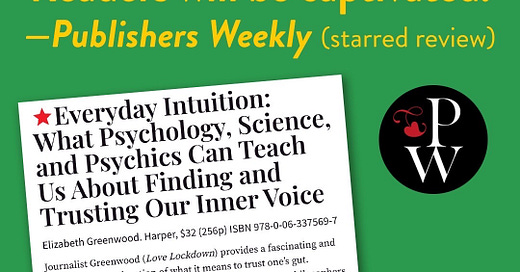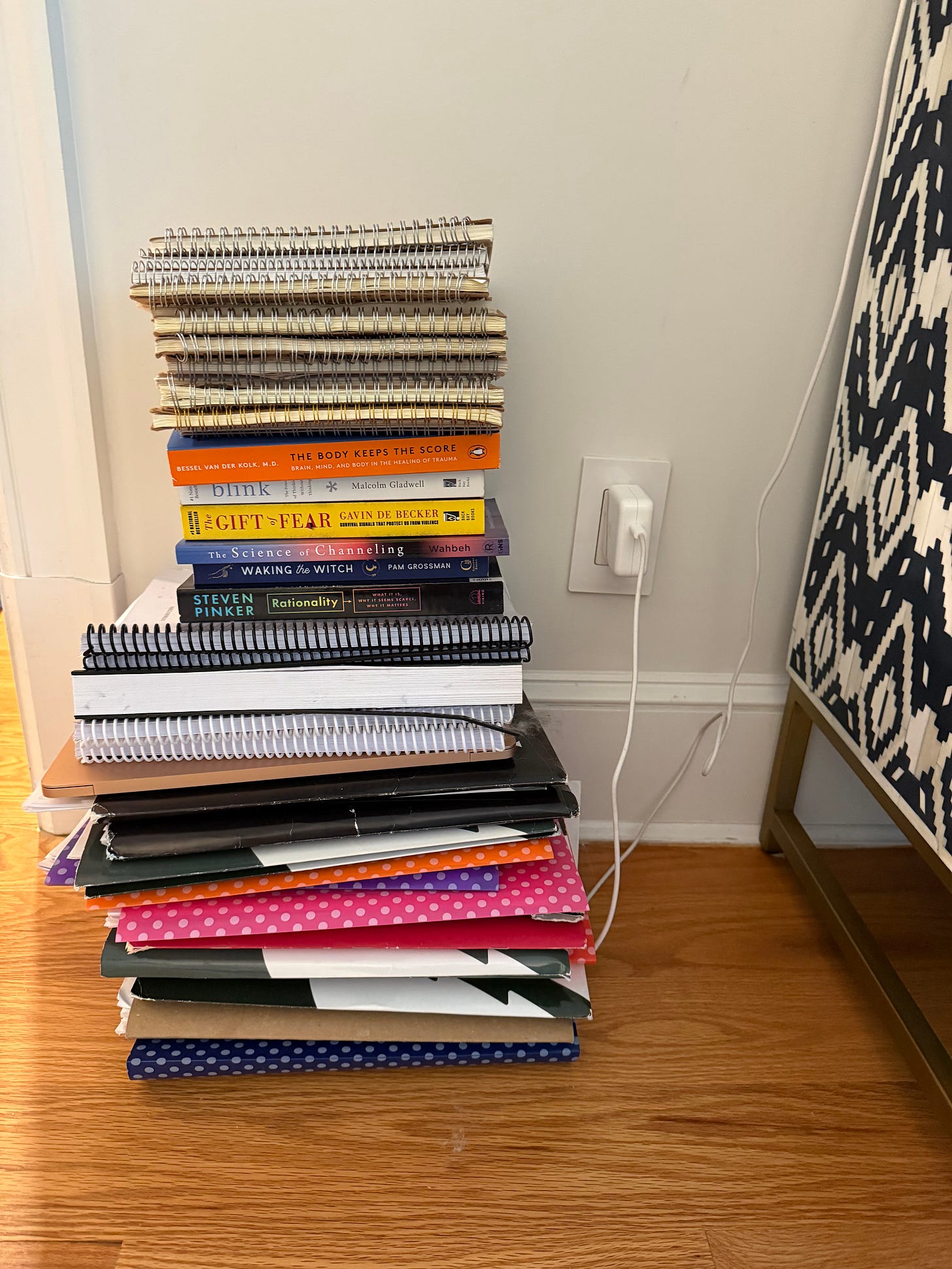But first, Everyday Intuition got a starred review in Publisher’s Weekly!!!!
What was I talking about? Oh yeah…
It’s funny how mundane one’s peculiar corner of expertise can become. Ten years ago when I was wrapping up research on Playing Dead a friend spied a Post-It on my desk upon which I had scribbled “Verify cost of death kit.”
“What the hell is a DEATH KIT and how much does it cost?!” she screamed. I could suddenly see from her point of view how bizarre such a note looked. But to my death fraud-glazed eyes, this could have been a note to self to pick up milk on the way home.
That’s the way it is when you work in isolation on a topic for years and years. It just becomes your thing, along with your shameful multiple-breakfast and midday pajama habits, and then one day you realize not *everyone* has also been sequestered in a little hovel of intellectual whimsy with you for those years and you have to put on pants and talk about it like a person in the world. The agony!!!
So today I’d like to talk about this “intuition” and what the hell I’m getting at.
At the outset of my research, writing about intuition felt like trying to staple Jell-O to the wall. Because what the hell is it? I’d use a very technical term, like “vibe.” That didn’t exactly seem like something you could take to the bank. Intuition is indeed a vibe, and it’s also knowing without knowing why (and I’d argue the “why” isn’t all that relevant, but your knowing is), and it’s direction: go this way, not that, move toward this and away from that. You can’t always show your work and mark how you got from point A to point B, and that can make you doubt it.
But after exploring intuition from many different angles—neuroscientific, corporeal, psychological, metaphysical, spiritual, and the plain old pragmatic—I realized something about intuition. While intuition is often derided as irrational, illogical, and fanciful, intuition actually *is* data.
And it’s data that bears listening to.
(notebooks and folders and drafts of all that learning)
From the scientific perspective, intuition is our brains recognizing patterns in the world and sending signals about the meaning of those patterns at light speed, often subperceptual and through biofeedback. Think: your palms sweat when you hear a certain song on the radio that you associate with a memory, even a deeply buried one. So, intuition is an ensemble of brain processes like memory activation, unconscious processing, and prediction. We make predictions based on past experience, and if you have a lot of experience in a given area—reading people, for example—then your intuitions probably come fast and correct. Since that super rapid processing of information is a wildly adaptive trait for humans living in complex environments, here’s the good news: intuition- you have it! You’re born with it. You don’t have to sit there wondering whether you are intuitive or not. You are.
Which is why associating intuition as an out-there, w**-w** thing actually makes no sense. Intuition, from the science-y perspective, is literally everything that’s ever happened to you that you are able to draw upon to make meaning from quickly and efficiently. Because intuitive hits do sometimes come out of “nowhere” (even though as we’ve just proved “nowhere” is actually everywhere???) it can feel otherworldly. As cognitive neuroscientist Sara Laszlo said on Voices in the River, intuition is “practicing so much it feels like magic.”
One reason why intuitive data can feel so slippery is because people experience intuition differently. For moi personally, intuition is both very embodied and very intellectual. I get sensations in my body, like constriction in my throat, when I don’t like something/one. Or if I think something/one is great, I’ll feel a warmth and expansion across my chest. Sometimes I’ll get an intuitive hit that is just a complete sentence, like “That’s a good idea,” or “stop, stay away.” But you know what else says “stop stay away?!” That’s right, your girl ANXIETY!
And that’s why intuition can be such a mess. But if we apply the framework of our scientists friends—intuition is pattern recognition based on expertise—then the best thing we can do is to become experts in ourselves. How and when do you pick up intuitive information? This is where the clairs are very helpful.
Again, this sort of thing might easily be cast as “w**-w**” but I prefer to think of the clairs broadly and as learning styles.
.
(illustration by That Girl Christopher Backs)
There’s clairvoyance (clear seeing), clairaudience (clear hearing), claircognizance (clear knowing), clairintellect (clear thinking), clairempathy (clear emotion), clairtangency (clear touching), clairalience (clear smelling), clairgustance (clear tasting), and other clairs not on this list that you might experience. They are useful shorthand for how you know what you know, and I believe we can conceptualize them broadly. Take clairvoyance, for example: the image that might spring to mind is someone gazing into a crystal ball. But clairvoyance can be much more than that. It can mean getting images, yes, but it also might mean noticing visual signs in your life.
I vividly remember standing on the street and reading an annoying email. I looked up, and right before me was graffiti reading please go away. Coincidence? Maybe, but noticing that little visual message made me smile and shrank my irritation, preventing me from getting totally hijacked.
Clairempathy can be picking up on other people’s emotions, feeling what other people are feeling—or just getting a specific feeling about something yourself. Clairintellect? You just know.
Spend some time—a week, a month—noting how you experience intuition. Is it a constriction in your throat, a drop in your stomach, a warm expanse across your chest (clairsentience)? Perhaps when meeting a new client or contractor you might get a distinct download like “This person is going to screw me over” or “This person is going to be a wonderful collaborator” (clairintellect). But even more broadly, ask yourself: When you have an intuition, do you feel it in your body? Does it come to you in a sentence? Do you get visual flashes or notice objects in your visual field that take on a special significance?
There are a bunch of quizzes you can take to learn your clair, but I have a feeling you probably already know.
Prompts for journaling and pondering:
Think about a time you heard your intuition. Whether or not you acted on it doesn’t matter. How did you get that piece of information? What tipped you off? How did you perceive it? As a bodily sensation? As a sentence deposited into your brain?
Does intuition sound/feel/smell/look distinct to you from other sensations? How so? How do you, personally, know when you are experiencing intuition?
When and where does it get confusing?
Choose a clair you’d like to work with. Find some very low stakes ways throughout the week to tune into this modality for information. For example, if you want to work with claircognizance practice listening for the straightforward, direct declarative sentence of what to do: cross the street, order the pizza, take the trazadone, order the leggings (I know nothing about any of this!!!) Be prepared to be surprised.
LIVE IN-PERSON EVENTS!
NYC: come catch me talk intuition with Women in Innovation on March 19!
SF: I’ll be speaking at my alma mater, the University of San Francisco, on March 22! RSVP here!
As you learn your personal intuitive language, might I recommend:
David Marchese interviewing Denzel Washington, as master class is what to do when a subject gives you NOTHING, or is downright fucking with you?!
Bridget Jones Mad About the Boy: WEEPING!!!!! So good to spend time with my old friends again.
Vantage Point by Sara Sligar is sublime beach reading, or anywhere reading.
This article by Olga Khazan is hilarious.
I rewatched Dirty Dancing on a plane recently and my god it holds up. Pro-labor, incredible outfits, somebody please throw a DD theme party, I have several costume changes in mind.
Going Varsity in Mariachi: made me want to gritar!!!








I love the word clairsentience!
What's the difference between ESP and intuition? Curious.